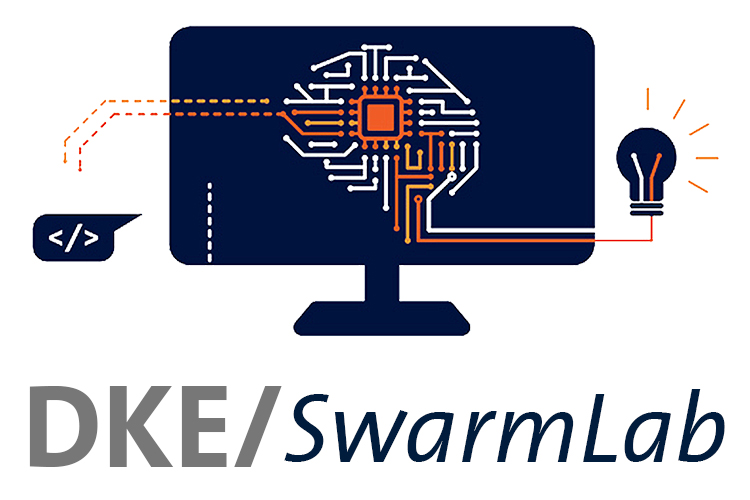Cognitive Robotics and Complex Self-Organising Systems (SwarmLab)
What do social networks, biological organisms, economic systems, and the human brain have in common? Their intelligence is in their network: these complex self-organizing systems are more than just the sum of their parts. At DKE SwarmLab we believe that understanding and exploiting the mechanisms that lead to self-organization in complex systems will lead to advanced artificial intelligent systems. One of our key research targets is the creation of cognitive robotic systems – human-friendly machines capable of perceiving, understanding, and interacting with their environment.
This is an old research theme of the Department of Data Science and Knowledge Engineering (DKE). DKE has become the Department of Advanced Computing Sciences.
In the real world, natural self-organising systems like those mentioned above tend to outperform artificially designed machines. Interdisciplinary research within DKE SwarmLab aims to study self-organising systems to learn their underlying mechanisms. Exploiting this knowledge will allow us to build better artificial intelligent systems that emerge through self-organisation.
Through DKE SwarmLab, DKE holds a chair in the steering committee of the FieldLab Robotics: a consortium of robotics and logistics companies in Limburg. SwarmLab and its partners attracted over 1.5 million euros in research funding since 2015.
Research focus and application
One of the most fascinating applications of complex self-organizing systems are cognitive robots – artificial machines that gain an understanding of their complex surroundings and of the other intelligent entities that surround them. Cognitive robots are capable of planning actions, correctly predicting the results of those actions, executing them, and adapting their behaviour based on their observations. At DKE SwarmLab we focus on the creation of assistive systems – supporting humans in their daily and professional life.
SwarmLab co-develops software and hardware for cognitive robots and complex self-organizing artificial intelligence. Currently running projects involve:
- Intelligent game and assessment devices with AI that assesses well-being, cognitive, physical, and social capabilities of children and elderly.
- Quadcopters capable of autonomously mapping, searching, and navigating in complex environments.
- Self-organization among autonomous agents in nautical processes in modern seaports.
- Smart orthotic devices.
- Advanced brain-robot interfaces.
- EDMO – Educational Modular Robot for teaching and exploring robotics, AI, and data science with students and children.

Scope
Together with our partners, DKE SwarmLab combines interdisciplinary research from a variety of individual research fields, including:
- Cognitive Robotics
- Machine Learning
- Multi-Agent Systems
- Serious Games
- Human-Machine Interaction
- Optimization and Artificial Evolution
- Computer Vision
- Control
- Natural Language Processing
- Assistive Robotics
- Educational Robotics
Go to SwarmLab website
Researchers












Lucas Dahl
- PhD candidate



Kirill Tumanov
- PhD candidate
Highlighted publications
- Alvanitopoulos, P., Diplaris, S., de Gelder, B., Shvets, A., Benayoun, M., Koulali, P., Moghnieh, A., Shekhawat, Y., Stentoumis, C., Hosmer, T., Anadol, R., Borreguero, M., Martin, A., Sciama, P., Avgerinakis, K., Petrantonakis, P., Briassouli, A., Mille, S., Tellios, A., ... Kompatsiaris, I. (2019). MindSpaces: Art-driven Adaptive Outdoors and Indoors Design. In 9th International Conference on Digital Presentation and Preservation of Cultural and Scientific Heritage (DiPP): DiPP2019 (Vol. 9, pp. 391-400). Digital presentation and preservation of cultural and scientific heritage
- Benitez-Andonegui, A., Burden, R., Benning, R., Möckel, R., Lührs, M., & Sorger, B. (2020). An Augmented-Reality fNIRS-Based Brain-Computer Interface: A Proof-of-Concept Study. Frontiers in Neuroscience, 14, [346]. https://doi.org/10.3389/fnins.2020.00346
- Liu, D., Spanakis, G., & Niehues, J. (2020). Low-Latency Sequence-to-Sequence Speech Recognition and Translation by Partial Hypothesis Selection. In Proceedings of Interspeech 2020 (pp. 3620-3624) https://doi.org/10.21437/Interspeech.2020-289
- Mariyam Christopher, S., Urlings, C., van den Bongarth, H., Coppens, K., Hurks, P. P. M., Borghans, L., & Möckel, R. (2019). A Digital Wooden Tabletop Maze for Estimation of Cognitive Capabilities in Children. In M. A. Salichs, S. S. Ge, E. I. Barakova, J. J. Cabibihan, A. R. Wagner, A. Castro-González, & H. He (Eds.), Social Robotics: 11th International Conference, ICSR 2019, Madrid, Spain, November 26-29, 2019, Proceedings (Vol. 11876, pp. 622-632). Springer. Lecture Notes in Computer Science Vol. 11876 https://doi.org/10.1007/978-3-030-35888-4_58
- Möckel, R., Dahl, L., & Mariyam Christopher, S. (2019). Interdisciplinary Teaching with the Versatile Low-Cost Modular Robotic Platform EDMO. In M. Moro, D. Alimisis, & L. Iocchi (Eds.), Educational Robotics in the Context of the Maker Movement (Vol. 946, pp. 135-146). Springer, Cham. Advances in Intelligent Systems and Computing https://doi.org/10.1007/978-3-030-18141-3
- Möckel, R., Dahl, L., Boonen, D., Parren, D., & Gou, Y. (2021). Robotics Education Under COVID-19 Conditions with Educational Modular Robots. In M. Malvezzi, D. Alimisis, & M. Moro (Eds.), Education in & with Robotics to Foster 21st-Century Skills: Proceedings of EDUROBOTICS 2020 (Vol. 982, pp. 26-38). Springer, Cham. Studies in Computional Intelligence Vol. 982 https://doi.org/10.1007/978-3-030-77022-8_3
- Montulet, R., & Briassouli, A. (2019). Deep Learning for Robust end-to-end Tone Mapping. In British Machine Vision Conference Proceedings.
- Montulet, R., & Briassouli, A. (2020). Densely Annotated Photorealistic Virtual Dataset Generation for Abnormal Event Detection. In Proceedings of the International Conference on Pattern Recognition, ICPR 2020: ICPR FGVRID Workshop: Fine-Grained Visual Recognition and re-Identification
- Niehues J. Continuous Learning in Neural Machine Translation using Bilingual Dictionaries. In Proceedings of the 16th Conference of the European Chapter of the Association for Computational Linguistics (EACL) 2021 April 19 (pp. 830-840). Association for Computational Linguistics
- Roos, N., & Sun, Z. (2019). Explainable Robotics applied to bipedal gait development. In BeNeLux Artificial Intelligence Conference (BNAIC): Proceedings of the Reference AI & ML Conference for Belgium, Netherlands & Luxemburg (Vol. 2491). CEUR Workshop Proceedings. http://ceur-ws.org/Vol-2491/paper38.pdf
- Sun, Z., & Roos, N. (2018). Dynamically stable walk control of biped humanoid on uneven and inclined terrain. Neurocomputing, 280, 111 - 122. https://doi.org/10.1016/j.neucom.2017.08.077
DKE research themes
- Affective & Visual Computing Lab
- Algorithms, complexity and optimization
- Cognitive Robotics and Complex Self-Organising Systems (SwarmLab)